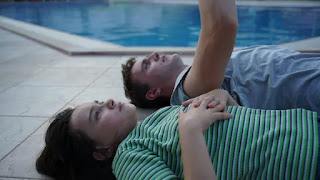AFTERSUN
(Charlotte Wells, 2022, UK/USA, 98 minutes)
"Can't we just live in hotels for the rest of our lives?"--Sophie (Frankie Corio)
In her directorial debut, Charlotte Wells begins in the past with smeary, pixelated camcorder footage shot by 11-year-old Sophie (newcomer Frankie Corio in a naturally effervescent performance) who finds her dad's dance moves embarrassing. He is, she jokes, "130 going on 131."
For reasons unexplained, Calum's left wrist is in a cast, which has to be a drag while traveling in Turkey--or anywhere (he's played by Irish actor Paul Mescal of Normal People). Calum and Sophie's mother are divorced.
Vacation for these two--or "holiday" as they say in the UK--means hotel rooms, swimming pools, bus rides, chess matches, and mud baths.
Calum has enough of a youthful affect that a teenage pool shark assumes Sophie is his sister, and he does almost seem more like an older brother or an uncle. He can be silly and mischievous, but the occasional sober moment descends like a grey cloud, like when he tells a scuba instructor that he can't see himself at 40...and that he's surprised he even made it to 30.
Calum encourages Sophie to play with the younger kids at the hotel, but she prefers to play pool with the teen congregation, with the exception of Michael (Brooklyn Toulson), an age-appropriate boy with whom she plays a coin-operated motorbike game. When the teenagers flirt and make out with each other, she watches with avid curiosity. Later, she and Michael enjoy their own brief romantic moment, a first for the both of them.
Only towards the end of their stay does Calum's mood shift, possibly because he knows he won't be seeing his daughter every day anymore--even if they can exasperate each other--because Sophie lives in Scotland with her mother, while Calum relocated to England after their divorce.
Then again, it might have nothing to do with Sophie. It could be because his girlfriend returned to her ex-boyfriend or because their business venture fell apart as a result of her departure. It could be anything--it could be everything--but he rallies, and Sophie doesn't seem to notice, or acknowledge, that anything was amiss.Throughout the film, Wells inter-cuts strobe-lit scenes of Calum dancing at a rave. He dances at the beginning of the film, and he dances at the end, but these scenes combine past and present (Mescal also dances throughout the Rolling Stones' video for "Scarlet"). They're memories, not flashbacks, since they include images of the adult Sophie (played by dancer and choreographer Celia Rowlson-Hall) watching and even appearing to dance with her father, circa their late-1990s vacation.
 |
| The Lost Daughter / Netflix |
Not until afterward did I realize that Maggie Gyllenhaal's 2021 directorial debut, The Lost Daughter, sort of predicts Aftersun. Not intentionally, since one film draws from personal experience and the other draws from an Elena Ferrante novel, but it isn't hard to see why Paul Mescal sparked to Charlotte Wells's script after appearing in a previous film involving a conflicted parent, a broken marriage, and a continental European vacation.
In The Lost Daughter, however, he plays a summer hotel worker (not a dad), but he establishes a vivid connection with Olivia Colman's professor (a divorced mother of two), just as he did with Daisy Edgar-Jones's fellow student in Normal People, and just as he does with Frankie Corio in her first movie role (she's already got a followup project in the works).
In other words, Mescal has, of late, been gravitating towards projects involving intense male-female interactions. I'm sure that won't describe every project he takes on in the future, like an upcoming film with The Crown's Josh O'Connor, any more than it describes every project he took on in the past--including a theatrical career in Dublin—but striking parallels abound, including God's Creatures, the new film from Saela Davis and The Fits' Ana Rose Holmer predicated on the relationship between a mother (played by Emily Watson) and her estranged son (played by Mescal).
 |
| Normal People / Hulu |
Much like Normal People, Aftersun lives and dies by the chemistry between the two leads, and Mescal and Corio are never less than fully convincing as father and daughter.
If Calum is at a slight disadvantage as a character, it's simply because Wells presents him strictly through Sophie's eyes, except for one private moment that his daughter is unlikely to have witnessed. It helps to explain what's going on beneath the surface—the way parents can put on a brave face for their children—but I feel a little conflicted, because most everything else is mediated through her experience. And yet the film would make less sense without it.
Though I couldn't say whether Wells considers writer-director Barry Jenkins an influence, his production company, Pastel, shepherded her first feature film from page to screen. I do know that Jenkins has long claimed Claire Denis as an influence, and I would imagine Wells does, too, since she luxuriates in the sensual, abstract possibilities of half-open doors, muffled voices, translucent surfaces, and sunlight on sweat-dappled skin.
These images, captured on video and etched in her mind, help Sophie to remember her father: forever young, forever dancing--forever a mystery.
Aftersun is playing at the Meridian and AMC Seattle 10. Images from A24 (Paul Mescal and Frankie Corio) and Netflix (Mescal with Olivia Colman)



No comments:
Post a Comment